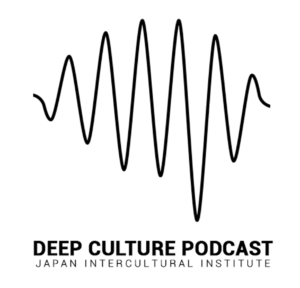These teaching materials use the Deep Culture Podcast to introduce key themes related to the psychology of intercultural understanding. These materials are open-source and are free to use for non-commercial purposes. Please attribute to: The Japan Intercultural Institute.
Pedagogical approach: Themes are brought to life by the interaction of the hosts and personal stories throughout the episode. Themes are related to the learner’s experience, rather than abstract conceptualization or ideology. They are grounded in cultural psychology and an understanding of culture, mind and cognitive processes.
What do these materials cover? These teaching materials use the Deep Culture Podcast to introduce key themes related to the psychology of intercultural understanding. By learning about culture and mind, we can better navigate our foreign experiences. Podcast episodes are a mix of personal experiences and basic insights from cultural and cognitive psychology.
Modules currently available:
- Ethnocentrism
- Stereotypes
- Culture Shock
- Culture and time
- Gender and Culture
- And more to come!
What materials are included?
-
- Episode link (To play episode)
- Episode download (To download full episode)
- Episode transcript (To download)
- PowerPoint slide set: Slides that can be used directly in the classroom and modified as necessary. Contains:
- Episode Overview – Summary of episode
- Opening Discussion – Introduces episode theme
- Key ideas and insights – Episode quotes, comprehension and discussion questions
- Deeper Understanding – Introduces the psychology behind the key themes
- Digging Deeper: Discussion questions connecting themes to learner’s experience.
- Testing and further activities: Slides include comprehension and discussion questions for quizzes or interactive activities.
- And more to come!
Who are these materials intended for? These materials were designed for young adult and adult learners with an intermediate to advanced level of English ability. They are intended for a wide range of educational contexts such as: high school or university classes, business training, NPO/NGO educational initiatives.
How can I use these materials? The presentation slides can be taken directly into the classroom. Individual slides highlight key ideas from podcast (with quotes from the podcast). There are comprehension questions as well as discussion questions which can be assigned in advance or worked on in class. Many of the modules include expansion activities. Educators are encouraged to use these materials as a jumping off point for further exploration of the key themes.
Can these materials be used for learners with limited English ability? These materials are designed with language learners in mind. It is not necessary to cover a whole podcast episode in one class. For lower-level learners, short clips can be used from the podcast to illustrate key points. Comprehension questions can be used to test understanding of key ideas.
How can I get started? Choose a theme . . . listen to the podcast while looking over the presentation slides. Decide what portion of the podcast to use, and identify the slides that will be most useful. Adapt them as necessary.
How can I get support and get involved? For questions about these materials, or to join the team of educators working on this project, contact us at: info (at) japanintercultural.org.
Permission and licensing These materials are open sourced and are shared under Creative Commons CC BY-NC 4.0. This gives you the right to use them for non-commercial purposes, including sharing and adapting. You must attribute the source – Japan Intercultural Institute. This does not permit commercial use (e.g. publishing for profit, materials for commercial trainings).
Acknowledgments A special thanks to the dedicated team of educators from different countries who worked so hard on this project. Contributors include: Sanne Bosma, Tannistha Dasgupta, Meena Eswaran, Jane Everett, Rob Fritz, Grazia Ghellini, Katarzyna Grzesik-Harz, Valerie Hansford, Jessica Janda, Christina Kapaun, Corazon Kato, Kasia Kucharska, Isabelle Al-Haj Johnston, Zeina Matar, Lynne Murphy, Lucile Roberts, Jo Thomas, Marie Tseng, and Revathi Viswanathan.
